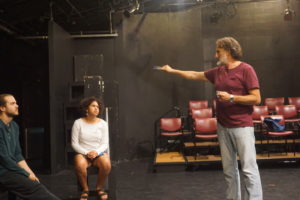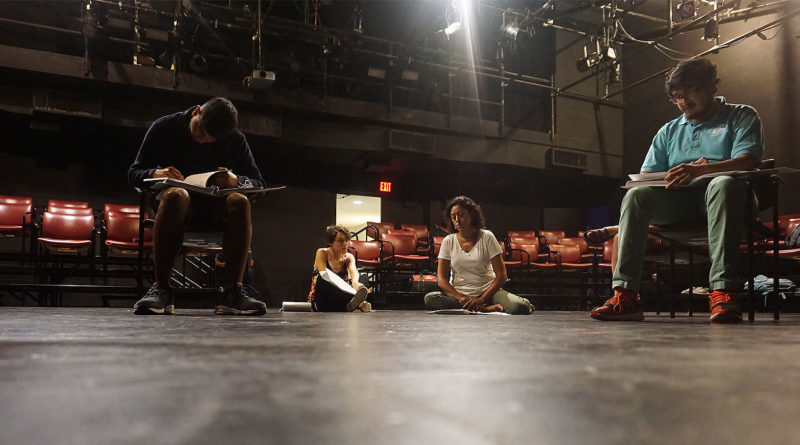Interview: Trinity University Professors Robert Huesca and Roberto Prestigiacomo on ‘End Stigma, End HIV/AIDS’
Trinity University’s Mellon Institute for Summer Research, in collaboration with AtticRep, is currently presenting an interactive theater production: End Stigma, End HIV/AIDS: A Forum Theatre Project. The piece was developed by Trinity Professor Robert Huesca, who was given invaluable support by AtticRep’s Artistic Director, Roberto Prestigacomo, in bringing the work to the stage.
This production is intended to function as local intervention to reduce the stigma surrounding HIV/AIDS testing and treatment in order to improve public health delivery. The piece will be performed at various locations around the city through mid-July. The schedule of performances is listed below.
This original production draws from in-depth interviews with 34 San Antonio residents to depict the actual experiences of stigma they were confronted with as related to HIV/AIDS testing and treatment. Each production includes a discussion with the audience, followed by a repeat performance that invites the public to participate in the action on the stage. The inclusion of “spect-actors” in the performance is integral to the Forum Theatre method. This is a tool that has been utilized successfully for decades to address social problems in many countries around the world.
I had the privilege of viewing a performance of End Stigma, End HIV/AIDS on June 9. Professors Huesca and Prestigiacomo were kind enough to answer some questions about the piece and give me some more background about this intriguingly activist type of theater.
What was the motivation behind the creation of this piece?
Robert Huesca: The performance constitutes a local intervention to address the HIV/AIDS epidemic by tackling one of the greatest impediments to HIV testing and AIDS treatment: stigma. The Forum Theatre method has been used internationally on a range of social problems with the objective of encouraging conversations and exchanges and developing strategies to address those problems. Within the HIV treatment scholarship, “stigma” is consistently identified as one of the most serious difficulties impeding testing and care.
How were the actors located and cast?

RH: The cast is comprised of five students, two professional actors and three local people living with HIV. I circulated a description of the project on campus last fall and had about 25 students come to my office for an interview. They were all very strong applicants, so selecting the five participants was difficult. After consulting with several faculty, I invited the five students who are in the play. Roberto contracted the local actors from his AtticRep and alumni network. The HIV+ participants were recruited from HIV and AIDS activist networks in San Antonio.
What do you hope will be achieved by this production?
RH: My hopes are modest. Stigma is a tenacious and entrenched social force. If we can create conversations and awareness in San Antonio that are then passed along by our audiences to others, I feel we will have made a good contribution toward improving social conditions.
How is the Mellon Institute for Summer Research involved?
RH: Trinity is the recipient of a Mellon Foundation grant to support undergraduate research. The program is built on a mentoring model, so students are paired with faculty to collaborate or work in close consultation. Most projects are one-on-one, but each year a “Mellon Institute” is available to bring together a team of students and faculty in an interdisciplinary project. That is what the Forum Theatre is. It brings together five students and three faculty from Theater, Communication, Modern Languages and Literature.
How were the audience reactions from the first performance on June 9th? Were they what you hoped for?
RH: Audiences have their own personalities and dynamics. Saturday’s audience was highly animated and engaged. Sometimes long periods of time can pass before anyone from the audience engages, but that was not the case with our first audience. Their level and quality of participation far exceeded my hopes and expectations.
How was the Forum Theatre developed? What other applications does it have?
Roberto Prestigiacomo: The Forum Theatre is a technique developed by Brazilian director Augusto Boal, and it is part of his Theatre of the Oppressed work, performed more than 30 years around the world. With AtticRep, I borrowed these techniques and developed them, making them part of my research, scholarship and creative activity. I brought Forum Theatre to San Antonio in 2007 with a project on homelessness in the city. This application of the Forum I know is the one that is applied to theater.
Give us a brief history of Theatre for Social Change and its goals.
RP: Theater for Social Change is a movement with AtticRep and Trinity University that we began here. The objective of TfSC is to identify submerged topics, explore them, and through theatrical means and tools, bring them to the surface of social discourse. Theater is a tool that creates a platform for dialogue, and with dialogue comes constructive change. The Forum Theatre Project gives the opportunity to people to intervene during the performance by taking the place of the actors and change the outcome of the play. The Forum is a rehearsal for life, too. If you get to practice intervention on stage, most probably you will get to intervene when witnessing oppression in real-life situations.
What’s on the horizon for Theatre for Social Change?
There are no limits to the further development of TfSC and the Forum Theatre Project. I teach Theatre for Social Change at Trinity University, and in the past three to four years, I have seen an increase in interest from every sector of society, and witnessed the various manifestations of TfSC in every field. With AtticRep, we brought our version of the Forum to India in 2014, and we will go to Palermo, Italy, Mexico City, Mexico, and Budapest, Hungary in 2019-2020.
END STIGMA, END HIV/AIDS PERFORMANCE SCHEDULE
Open to the public:
- Sunday July 1, 3:00 p.m. — Esperanza Peace and Justice Center, 922 Main St.
By invitation only:
- Friday June 15, noon — San Antonio AIDS Foundation
- Friday June 29, 10:30 a.m. — Alamo Area Resource Center
- Monday July 9, 2 p.m. — BEAT AIDS
- Wednesday July 11, 9 a.m. — San Antonio HIV/Syphilis Task Force
Performances are free of charge. For more information, contact Professor Robert Huesca, rhuesca@trinity.edu, 210-999-8169.
Photos courtesy AtticRep




